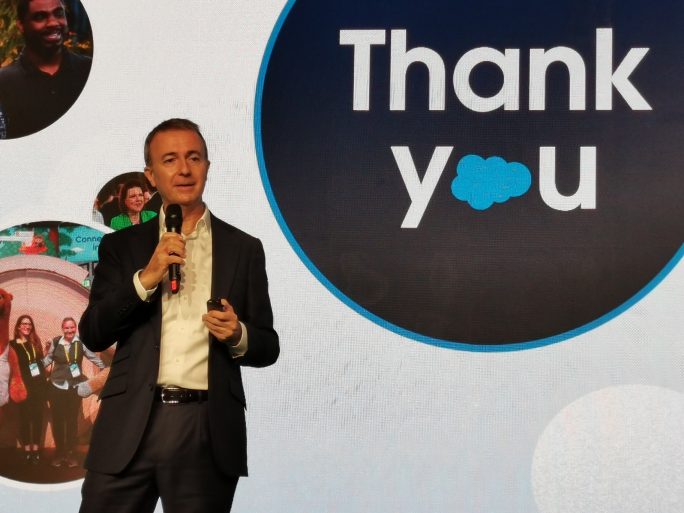Einstein 1, Salesforce’s formula for solving the intersection of data, CRM and AI

During the Salesforce Innovation Day, the cloud software manufacturer brought new capabilities based on artificial intelligence and trust to the Spanish market.
Salesforce held the Salesforce Innovation Day conference in Madrid this week, bringing together more than 700 professionals from the technology industry. We were there to learn first-hand about the next level of digitalisation that the company intends to bring about through the adoption of artificial intelligence and a more unified use of corporate data, but always based on trust, one of today’s main concerns.
We are at a time when data, CRM and artificial intelligence are intersecting, as Enrique Polo de Lara, SVP and Country Leader of Salesforce Iberia, stated during the opening session. It is not only about extracting value from the information that organisations manage, but also about doing so in a secure and reliable way, even more so with the arrival of generative artificial intelligence in corporate environments. These are areas in which employees themselves are already using it more than their employers admit, which means that there is a certain lack of control over these resources, the so-called Shadow AI.

It is true that AI is designed to improve worker productivity, but it also poses a significant risk in terms of privacy and corporate data sovereignty. It should not be forgotten that by making use of these algorithms without corporate control, data could be shared publicly, thus generating significant risks for companies.
Salesforce is clear that this intersection is the technological innovation that will have the greatest impact on business over the next decade, making trust – a shrinking asset according to experts – vital in the age of artificial intelligence for any organisation.
Einstein 1, Salesforce’s answer
To respond to the opportunities that AI facilitates with trust, Salesforce announced in September Einstein 1, a platform for managing data and deploying artificial intelligence and automation across any of the applications that are part of the Salesforce ecosystem. During this Innovation Day it has been one of the main protagonists.
Einstein 1 is natively integrated into each of them, providing intelligence (predictive and generative) and automation to reduce the time workers spend on tasks that provide less value to focus on others that impact more fully on business decision making.
In addition, it incorporates low code and no code methods to facilitate the design of processes and the democratisation of the use of these technologies, something to be taken into account by those who do not have advanced knowledge of development.
Finally, the company indicates that it is an open platform so that other solutions can make use of these capabilities.
On a more strategic level is Einstein Trust Layer, a secure AI architecture, also natively integrated into the Salesforce platform. For the software manufacturer, this is the layer that allows working with data and generative artificial intelligence in a reliable way because it has been built with the best security barriers and under the premise of maintaining the ethical codes that Salesforce has been promoting for some time under the ‘Ethics by Design’ umbrella.
Pau Contreras, VP Solution Engineering at Salesforce, and Gonzalo Goñi, Director Solution Engineering at Salesforce, explained the main features of Einstein 1 and the Einstein Trust Layer security layer, stressing that: “Customers’ data is not our product, they are the ones who control access to their information. We prioritise ethical, trustworthy and transparent use when using artificial intelligence.

The Einstein Trust Layer sits right between applications and generative AI models to control all the processes that occur in the interaction lifecycle with it, from human language queries to the generation of answers, through the retrieval of the data requested, its masking, toxicity detection, auditing… and all this without retaining corporate information to preserve its integrity.
It is important to note that Einstein Trust Layer applies to both public and private generative AI models, so the company ensures that corporate data will never be shared externally.
Data integration with Einstein 1 Data Cloud
The world of corporate data is completely atomised. The adoption of public and private cloud models, as well as the legacy that still exists in organisations, has not helped to find a standard for storing information – quite the opposite.
This is a problem that has dogged organisations for years, and software vendors have been redoubling their efforts to integrate and unify data to extract its full potential.
That is the goal of Einstein 1 Data Cloud, a middleware capable of connecting with any source of information, whether structured, unstructured or semi-structured, to harmonise, prepare, transform and share it in real time so that it is available in all CRM applications.
Data Cloud is, according to Salesforce, the solution to unlock the power of data, because, once properly processed, it allows all the innovations available in applications and artificial intelligence to be applied to it.
As part of Salesforce’s strategy to integrate artificial intelligence into the workflows of the applications that make up Salesforce 360, Pau Contreras (with whom we had the opportunity to chat during the meeting) told us about the integration of technology from Airkit, a company recently acquired by the company and specialising in the construction of a natural language model specific to the field of e-commerce, something that “will help enormously to improve user productivity in this field”, said Contreras.